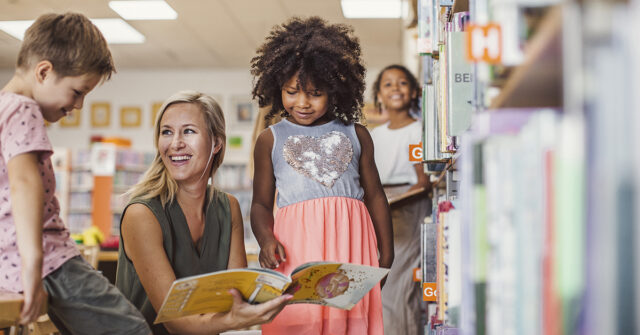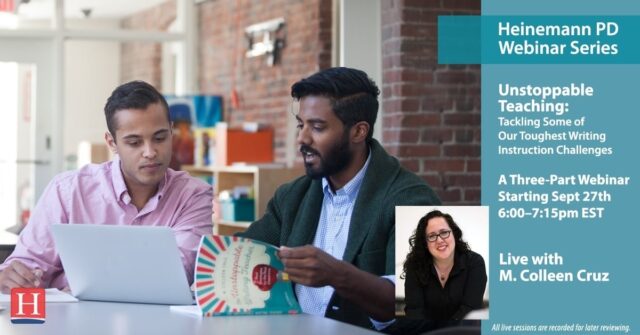Connie Dierking is the co-author, with Sherra Jones, of Oral Mentor Texts. Their book presents new ways to use the power of oral language to reinforce comprehension and help writers internalize narrative structures. In a special blog for Heinemann, Connie explains that the beginning of the school year is the time for celebrating story. (click here to read an earlier blog from Connie Dierking on What is an Oral Mentor Text)
Connie Dierking is the co-author, with Sherra Jones, of Oral Mentor Texts. Their book presents new ways to use the power of oral language to reinforce comprehension and help writers internalize narrative structures. In a special blog for Heinemann, Connie explains that the beginning of the school year is the time for celebrating story. (click here to read an earlier blog from Connie Dierking on What is an Oral Mentor Text)
I just received the annual conference issue of NCTE’s The Council Chronicle and was thrilled when I saw the conference theme: “Story as the Landscape of Knowing.” Program chairman Kathy Short writes, “Story is the landscape within which we live as teachers and researchers—our knowledge is ordered by story.” It is exciting to see the importance of story held in such high esteem.
 There is no better time to celebrate story than the beginning of the school year. We come to know our students through the stories they tell. I look at Becky with her little bob haircut and know this new style is the result of bubble gum stuck in her ponytail. I smile inside when I remember Geri’s story about her first jump into the deep end of the swimming pool. I am amazed to hear that Robbie broke his arm the first week of summer but recovered in time for the play-offs. I know which children have dogs or cats or fish. I know who has a mean big brother or sister or no brother or sister. I know who lives by the ocean and who lives in a really small apartment. I also know that Ramon doesn’t share a story and that Sam tells pieces of stories that don’t make much sense. Story is front and center in my classroom; through it I build a community. We tell individual stories, and we come to know one another as learners and as people. We share our common stories: the nervous stomach on the first day of school or the funny statue in the library that seems to watch us with her eyes. We join together as a community in the way that only a shared experience engenders.
There is no better time to celebrate story than the beginning of the school year. We come to know our students through the stories they tell. I look at Becky with her little bob haircut and know this new style is the result of bubble gum stuck in her ponytail. I smile inside when I remember Geri’s story about her first jump into the deep end of the swimming pool. I am amazed to hear that Robbie broke his arm the first week of summer but recovered in time for the play-offs. I know which children have dogs or cats or fish. I know who has a mean big brother or sister or no brother or sister. I know who lives by the ocean and who lives in a really small apartment. I also know that Ramon doesn’t share a story and that Sam tells pieces of stories that don’t make much sense. Story is front and center in my classroom; through it I build a community. We tell individual stories, and we come to know one another as learners and as people. We share our common stories: the nervous stomach on the first day of school or the funny statue in the library that seems to watch us with her eyes. We join together as a community in the way that only a shared experience engenders.
The first days of school, when students are practicing fire drills, learning the rules of the cafeteria, enjoying the shade of the big tree outside, or learning how to share and listen with a friend, are the seeds for stories to come. These simple events can and should be the stuff of shared class stories. While building community through story, we are also building a foundation for literacy. According to Jerone Bruner, “Proficiency in oral language provides children with a vital tool for thought. Without fluent and structured oral language, children will find it very difficult to think.” It all begins in September.
Elaine Reese, in her The Atlantic article “What Kids Learn From Hearing Family Stories,” writes, “Family stories can be told nearly anywhere. They cost us only our time, our memories, our creativity. They can inspire us, protect us, and bind us to others. So be generous with your stories, and be generous in your stories. Remember that your children may have them for a lifetime.” School can be a wonderful place to support and develop the oral language skills necessary for telling a story, whether children come into the classroom having had rich family storytelling and literacy experiences or not. In the early days in a primary classroom, we are beginning to know all our students. While the literacy road ahead may seem dauntingly long (for some students more than others), there is good news: we can create wonderful story experiences in this very classroom.
Click here to read a sample chapter of Oral Mentor Texts
References
Bruner, Jerome S. 1985. Child’s Talk: Learning to Use Language. New York: W.W. Norton.
Dierking, Connie, and Sherra Jones. 2014. Oral Mentor Texts: A Powerful Tool for Teaching Reading, Writing, Speaking, and Listening. Portsmouth, NH: Heinemann.
National Council of Teachers of English. 2014. The Council Chronicle, August. Urbana, IL: NCTE.
Reese, Elaine. 2013. “What Kids Learn From Hearing Family Stories.” The Atlantic, December 9.


